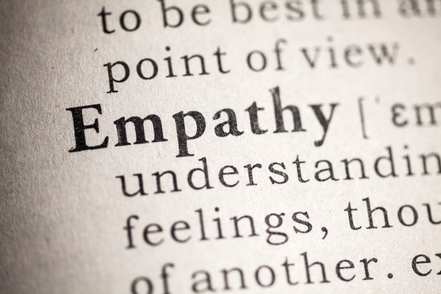One of the best ways to cultivate empathy is to truly listen to people. To listen with your ears, eyes and heart. To pay attention to their body language, to their tone of voice, to the hidden emotions behind what they are saying. To be fully present. Making someone feel that they are truly listened to is the most fundamental aspect of empathy.
Listening ideally requires three things. First, paraphrase what the person said to show that you understand. Second, reflect back to them your emotional reaction. Reflecting back your emotions helps the person better understand and regulate their own emotions. Third, share with them how your response makes you want to behave. By expressing your behavior, you are demonstrating that you understand their emotional state, it also helps them to figure out a behavior to move forward with. I've included more on listening later in this post.
Another great way to cultivate empathy is to live with curiosity. To take a personal interest in people of all walks of life. Show people that you care and have a genuine, nonjudgmental curiosity about their life. Ask them questions about their family, their work, their hobbies, their challenges, their aspirations, about what makes them happy.
Understand our commonality and that we are all one. Consider that everyone has a mind, a body and a heartbeat. That everyone has dreams, everyone has fears, everyone wants to be loved, everyone wants to be happy. Remember that whatever effects you and impacts you, in turn impacts me. This can take some practice, but it can change the way you interact with the world.
Here are six negative listening habits (taken from Priceless Professional Development). Do you see yourself in any of them?
1. Faker: All the outward signs are there: nodding, making eye contact giving the occasional uh-huh. However, the faker isn’t concentrating on the speaker. His mind is elsewhere. He or she is pretending to listen.
2. The Interrupter: The interrupter doesn’t allow the speaker to finish and doesn’t ask clarifying questions or seek more information from the speaker. He’s too anxious to speak his words than to listen.
3. The Happy Hooker: The happy hooker uses the speaker’s words only as a way to get to his message across. When the speaker says something, and frankly it could be anything, the happy hooker steals the focus and then changes to his own point of view, opinion, story or facts. Favorite hooker lines are, “Oh that’s nothing, here’s what happened to me...”, “ I remember when I was…”
4. The Advice Giver: Giving advice is sometimes helpful; however, at other times, this behavior interferes with good listening, because it does not allow the speaker to fully articulate his feelings or thoughts; it doesn’t help the speaker solve his own problems; it prohibits venting; it could also belittle the speaker by minimizing a concern with a quick solution. Well-placed advice is an important function in selling and leading. However, advice given too quickly, and at the wrong time, is a turnoff to the speaker.
5. Rebuttal-Maker: This listener only listens long enough to form a rebuttal. His point is to use the speaker’s words against him. At his worst, he is argumentative and wants to prove you wrong. At the least, this person always wants to make the speaker see his point of view.
6. The Intellectual or Logical Listener: This person is always trying to interpret what the speaker is saying and why. He’s judging the speaker’s words and trying to fit them into his logic box. He rarely asks about the underlying feeling or emotion attached to a message.
When practicing empathy we are practicing positive listening skills, not these type of negative listening habits. Empathy says I'm here for you, I'm in it with you, I'm not here to fix you or to judge you, I'm here to feel with you and to let you know that you are not alone.
Being able to practice empathy is one of the most important skills that we can learn. In a world that spends so much time picking at flaws and weaknesses, feeding off of fear and anger in people, empathy can serve to offset that fear and anger. Empathy and compassion lead to love and kindness, helping us to lead more fulfilling and healthier lives. Cultivating and practicing empathy is like a muscle that strengthens the more we use it.
I would love to hear what you think. Did you recognize yourself in any of the six negative listening habits? How do you work to cultivate and practice empathy in your life? Please drop me a comment or send me an email.





 RSS Feed
RSS Feed
